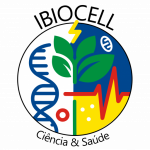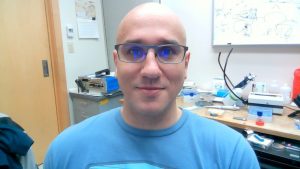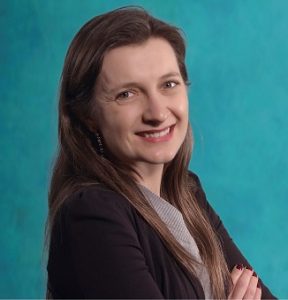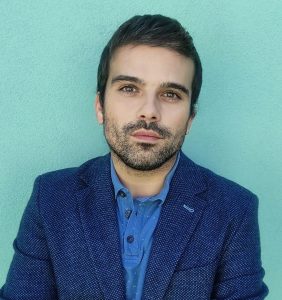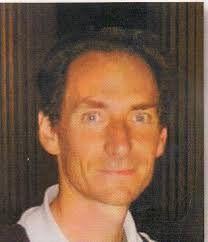3. Equipe Internacional
Dr. André Luiz Andreotti Dagostin 
Vollum Institute
Oregon Health and Science University
https://www.ohsu.edu/vollum-institute
https://www.researchgate.net/profile/Andre-Dagostin/research
https://scholar.google.com/citations?hl=en&user=pjH-VfcAAAAJ&view_op=list_works&gmla=AH70aAWyOBHxS2XgqStU8Vdr6Gj33P_BqlbjNU487R7G4P3mLO9VYidK1HR31MaU41A8f_Y7w9SV7MLymZGUcjPS
I am a Biologist who graduated from the Universidade Estadual do Oeste do Paraná (UNIOESTE/Brazil). There, I developed an interest in biophysics, which led me to specialize in membrane biophysics and neurotransmission. I am a cellular electrophysiologist trained by the University of São Paulo (FMRP-USP), where I got my master’s and Ph.D. degrees studying neuronal properties in songbirds and developing side projects in drug testing and neurotransmission in different biological models. In my postdoc at the Vollum Institute (OHSU-USA), I worked with drug testing, biophysical properties, and neurotransmission in neurons of the auditory system using pharmacology, patch-clamping, dynamic clamping, and calcium dynamics (spinning-disk confocal imaging). Currently, I am a Senior Research Associate at the same institution where we investigate the association of Alzheimer’s disease with hearing loss using patch clamping, auditory brainstem recordings, and behavioral tests.
Dra. Barbara Graziela Postal 
Diretora Médica Global em Microbiota, Biocodex
http://lattes.cnpq.br/9241580579198363
email: barbara.postal5@gmail.com
Undergraduate in Pharmacy (UFSC/Brazil), Master in Pharmacy (UFSC/Brazil), PhD in Physiology, Physiopathology and Therapeutics (Sorbonne University/France) and Pos-doc at Inflammation Research Center – INSERM – Université de Paris/France. In 2008, she began her academic journey in the Pharmacy program at the Federal University of Santa Catarina (UFSC). Simultaneously, she initiated her research career as a recipient of multiple scholarships funded by CNPq and CAPES, as summarized: 2011 – Undergraduate Research Scholarship (PIBIC-CNPq/UFSC): Investigated the influence of various flavonoids on the activity of the SGLT-1 glucose sensor in the intestine. 2012 – Undergraduate Research Scholarship (PIBIC-CNPq/UFSC): Conducted a phytochemical and biological evaluation of Brazilian and Colombian Passiflora species in an experimental model of diabetes. 2012–2013 – CAPES Scholarship (Science Without Borders Program): Carried out a one-year research exchange at the University of Caen Normandy (UNICAEN), France. 2013 – Technical Support Scholarship (CNPq/UFSC): Supported the implementation of new research methodologies aimed at improving scientific training and bibliographic productivity. 2014 – Scientific Initiation Scholarship (MCTI/CNPq Notice No. 14/2013): Participated in the project “Insulin resistance and diabetes mellitus: molecular bases for new therapeutic perspectives.” 2015 – CAPES Master’s Scholarship (PPG-Pharmacy/UFSC): Focused on characterizing the effects and signaling pathways of compounds in Ilex paraguariensis (yerba mate) involved in glucose homeostasis. In September 2015, she commenced her full Ph.D. abroad, funded by a CNPq doctoral scholarship through the Science Without Borders Program (Process No. 207303/2014-2). This program supported her advanced academic training in France, which concluded in June 2019. She currently serves as global medical director for microbiota and mature products on the scientific team at the French multinational pharmaceutical company Biocodex. She has 16 peer-reviewed publications, 2 book chapters; H-index= 9. Her research expertise is in intestinal physiology, immunology, and pathophysiology, with a strong focus on the interplay between environmental factors, intestinal microbiota, intestinal barrier integrity, and low-grade inflammation in obesity. Her work deeply explores the molecular mechanisms governing intestinal epithelial dysfunctions, particularly the roles of tight junction proteins, cytokine signaling, and transcriptional regulators such as the Aryl Hydrocarbon Receptor (AhR). She investigated the disruption of tight junctions and the initiation of pro-inflammatory signaling cascades in both in vivo (murine models) and in vitro (Caco-2/TC7 human intestinal epithelial cells) systems. A substantial component of her research interest centers on how the gut microbiota influences the intestinal and overall human health, especially how dysbiosis contributes to diseases onset and how microbiota-based products, such as probiotics and Live Biotherapeutic Products (LBPs) could mitigate these effects and help patients. She is also an active science communicator and educator, with a long-standing.
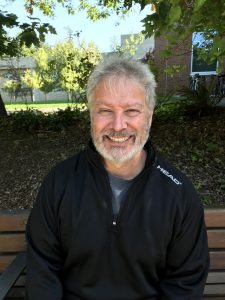
Professor Dr. Brian Ross Christie 
Division of Medical Sciences
University of Victoria, Canada
https://onlineacademiccommunity.uvic.ca/christielab/
https://www.uvic.ca/research/labs/christie/
https://orcid.org/0000-0002-6830-0160
Dr. Christie completed an MSc. at the University of Calgary (Canada), a Ph.D. at the University of Otago (New Zealand), and his post-doctoral training at Baylor College of Medicine (United States) and the Salk Institute for Biological Sciences (United States). Dr. Christie was recruited to the University of British Columbia in 2001, where he became an active member of the rapidly growing Djavad Mowafaghian Centre for Brain Health. In 2007, Dr. Christie moved his laboratory to start a research program at the newly created UBC Island Medical Program in Victoria, BC. In his initial years at the University of Victoria, Dr. Christie helped found the Neuroscience Graduate Program at UVic and served as the inaugural program director and graduate advisor. Throughout these years, Dr. Christie has supervised more than 50 students, between master’s and doctoral students, and has more than 150 publications. Dr. Christie’s research program continues to focus on brain plasticity, with a particular emphasis on promoting functional recovery in both acquired (i.e., brain injury) and congenital (i.e., FASD, FXS) neuropathological conditions in the aging brain.
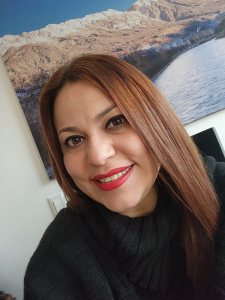
Profa. Dra. Diana Marcela Aragón Novoa 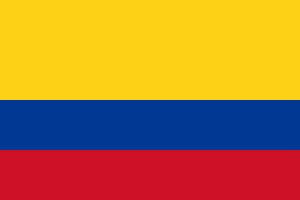
Departamento de Farmácia, Facultad de Ciencias
Universidad Nacional de Colombia, Bogotá, Colombia
http://lattes.cnpq.br/0460469945663417
https://orcid.org/0000-0003-2862-3771
https://scholar.google.com/citations?user=WPJjwj4AAAAJ&hl=es
Diana Marcela Aragón is Pharmacist, PhD in Pharmaceutical Science, Full Professor of the National University of Colombia. She has experience in the research and development of new drug delivery systems, extract standardization and the study of pharmacokinetic and biopharmaceutical properties of different active pharmaceutical agents. She has supervised more than 20 Master and PhD Thesis and has published more than 50 scientific papers, 7 scientific book chapters and 1 book about the role of women in science. Her PhD thesis was awarded as “Meritorious Thesis”, also has been awarded for her performance as researcher in the National University of Colombia and is a Senior researcher according to the Ministry of Science of Colombia. In the National University of Colombia she has held academic-administrative positions as director of the undergraduate and graduate Pharmacy programs and Vice-Dean of the Faculty of Science. She has led research projects funded by different organizations with Colombian and foreign participants. She has been an invited researcher in Federal University of Rio Grande do Sul (Brazil) and Innsbruck University (Austria) and have developed several projects in collaboration with Federal University of Santa Catarina (Brazil), since 2017. Is member of the Ibero-American Pharmacometrics Network and topic editor and guest editor of the scientific journal “Pharmaceutics “. She has led research projects funded by different organizations with Colombian and foreign participants and has been an invited researcher in different foreign Universities. Is member of the Ibero-American Pharmacometrics Network (RedIF) and of the Organization for Women in Science for the Developing World (OWSD-Colombia).
Prof. Dr. MARCO AURÉLIO GOUVEIA ALVES 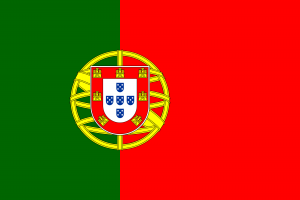
Departamento de Ciências Médicas
Universidade de Aveiro, Portugal
https://orcid.org/0000-0001-7635-783X
https://sites.google.com/view/sertolicellgametebiology/group-members/alves-m-g
In 2011, Marco G. Alves obtained his PhD degree in Biochemistry, branch of Bioenergetics, at University of Coimbra, Portugal. In the last years he has been awarded with several fellowships and prizes and is a team member of several ended and ongoing funded projects. He is also ad-hoc reviewer in several top journals and serves as editorial board member of some journals. His main lines of research are focused on reproductive biology, obesity, diabetes, metabolism, metabolic modulation and cellular metabolic profiles. He has more than 200 publications in the last years (2009-2023) in leading peer-review journals including some invited reviews. These publications are mostly focused on Sertoli cell metabolism and modulation of these cells metabolic behavior under pathological conditions. Also in mitochondrial physiology and quality control as well as metabolomics. Academic Editor of Medicine® Journal; editorial board member of Antioxidants and Redox Signaling, Scientific Reports, Toxicology and Applied Pharmacology, Antioxidants, Plos One and Nutrition & Metabolism Journal, Reproductive Sciences; Since 2011 is Reviewer/TOP Reviewer for more than 80 peer-review journals. Supervised 26 master students. Supervises 7 master students, 8 funded PhD students and 2 funded post-doc researchers. He has raised more than € 1M has PI and 1.5 M € as team member, including grants from pharmaceutical companies. He is also inventor of two patents and has been listed in World’s Top 2% Scientists list according to the University of Stanford study that ranks the most cited scientists based on SCOPUS. He served as Invited Professor and/or Short-term researcher in Institutions from Brazil, USA, Spain, Italy, UK. His team objective is to develop cutting-edge technologies that may improve reproductive technologies, particularly regarding spermatozoa selection and the epigenetic information it may contain. The clinical applications of our findings are significant and address broader societal and economic challenges. By paving the way for personalized male fertility management, our work contributes to improving the health of future generations—a dimension often overlooked by stakeholders. This comprehensive approach aims to bridge existing gaps in understanding and offers a transformative perspective on the interplay between paternal factors and health outcomes.
Prof. Dr. Romain Guinamard 
UNIVERSITÉ DE CAEN, NORMANDIE, FRANCE
https://orcid.org/0000-0003-0276-8884
Specialized in the study of ion channels for more than 20 years, I had the opportunity to be interested in different targets such as chloride channels, potassium and especially non-selective cation channels. These studies were carried out mainly by the electrophysiological patch-clamp technique for which I use a single channel approach which allows the recording of ionic currents passing through a single channel protein. It is this particular expertise that I will bring to the proposed project. It should be noted that in 2019 I did a 15-day stay in Fatima Silva’s laboratory (CAPES-PrINT) in Florianopolis during which I was able to evaluate the electrophysiological equipment available and note, with supporting recordings, that it was suitable for single channel approaches. During this stay, I also gave theoretical lessons with master’s or PhD students from Santa Catarina University.
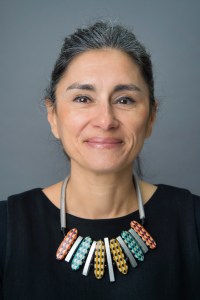
Prof. Dra. Silvia Vilares Conde 
NOVA Medical School, Faculdade de Ciências Médicas, Universidade NOVA de Lisboa, Portugal
ORCID ID: orcid.org/0000-0002-5920-5700
Research gate: https://www.researchgate.net/profile/Silvia_Conde
Google Scholar: https://scholar.google.pt/citations?user=THyBECkAAAAJ&hl=en
Loop: https://loop.frontiersin.org/people/154176/overview
Url for website: https://www.nms.unl.pt/pt-pt/investigacao/grupos-de-investigacao/detalhe/n/controlo-neuronal-das-doencas-metabolicas-estrategias-terapeuticas
Silvia V. Conde is Professor of Pharmacology and Neuroscience at NOVA Medical School (NMS) and Principal Investigator at NMS Research. Additionally, she teaches at the postgraduate level in the NOVA Biomedical Research Master and in several PhD programs. She pursued her PhD in Life Sciences, field of Pharmacology from the New University of Lisbon (Portugal) and from the University of Valladolid (Spain) in 2007, on the role of purines in hypoxic signaling in the carotid body (CB). Afterwards, she dedicated to understand the pathophysiological alterations in the CB and autonomic nervous system that are in the genesis of cardiometabolic and respiratory Human diseases. As a PI, she developed a new line of research on CB and dysmetabolism, based on the pioneering idea that CB controls glucose homeostasis. She is dedicated to characterization of pathophysiological biosignals, disease signatures and fingerprints that will allow the identification of targets for therapy, particularly bioelectronic targets, as her group described that high frequency electrical stimulation of carotid sinus nerve restores glucose homeostasis in type 2 diabetes models. Her research within this field originated 2 patents. She published more than 75 peer-reviewed publications, some of which in the top 10 journals in the field of Diabetes and Physiology (Diabetes, Diabetologia, Journal of Physiology). From these publications, 75% are in Q1 journals and 25% in Q2. She has a h index of 26 in googlescholar and of 23 in Scopus. In 2009 she was awarded with the L’Oreal Medals Honor for Women in Science Portugal and since then her group won several national and international prizes from e.g. Portuguese Society of Diabetes, the Pulido Valente Foundation, International Society for Arterial Chemoreception among others. She pursued her Habilitation Degree, which is the highest University degree, in Health Sciences, field of Biomedicine, in 2022.

